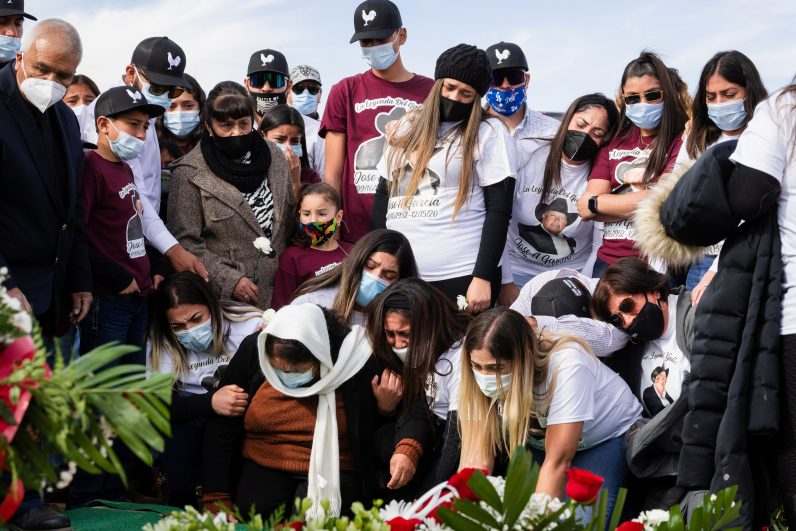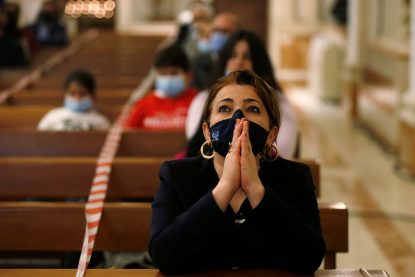
Family members and loved ones of Jose Garcia cry as he is laid to rest at San Jose Cemetery in La Mesa, N.M., Dec. 22, 2020. He died from the coronavirus. It is inarguable that this Lent meets us in a place of profound personal and communal suffering and loss, of unending uncertainty and anxiety, of unanswered prayers. (CNS photo/Justin Hamel, Handout via Reuters)
I know that I am not the only one for whom this year has been full of unpredictable moments. More than anything, this year has reminded me how completely out of control I am. I’ve found myself especially drawn to the changing of the seasons, I think, in part, because of the predictability they’ve offered.
As Advent and then Christmas rolled on, I found myself saying, “Yes! Change. But at least this one I can predict.” I craved a “normal” Advent after a year that had felt so unjustly unusual.
Just like our incarnate God of unconditional love who we encountered at Christmas, the seasons, both liturgical and natural, meet us exactly where we are. There is something so deeply comforting about this. Whether we feel ready for them or not, they arrive, just as they have every year.
[hotblock]
It is inarguable that this Lent meets us in a place of profound personal and communal suffering and loss, of unending uncertainty and anxiety, of unanswered prayers.
God’s heart breaks with ours as we grieve for all that is and has been lost without explanation during the past year: hugs from those we love, the countless lives of family and friends, space together for ritual and grieving at the time when we need it the most.
What can we fast from when it feels like we’ve already given up so much?
I am still shaken and grieving, and I feel my heart hardening to the suffering that surrounds me, particularly the lives lost of those I love. I know I am not alone in saying that I am angry and hurting at the start of this Lent.
The only semblance of an answer that I have right now is, this Lent, let us resist the temptations to move past the suffering we have experienced. Now is not the time for finding inauthentic silver linings when our hearts need to break open for ourselves and for one another.
Pope Francis reminds us that as disciples of Jesus, living in a broken world plagued with the failures of capitalism and indifference we are operating from within a toxic “throwaway culture” that sees unwanted items and people as inconvenient and therefore, disposable.

A woman wearing a protective mask prays during Mass at the Church of the Sacred Heart in Amman, Jordan, Dec. 6, 2020, during the COVID-19 pandemic. It is inarguable that this Lent meets us in a place of profound personal and communal suffering and loss, of unending uncertainty and anxiety, of unanswered prayers. (CNS photo/Muhammad Hamed, Reuters)
Inexplicable hurt is inconvenient. It is easy from within this culture for our hearts be hardened, to become indifferent and apathetic to the suffering of those around us.
Imagine the heart of God during this time, a heart that both breaks at the suffering of the world and that still continually reaches out after each and every one of us, continuously falling in love with us, flaws and all.
In Pope Francis’ 2015 Lenten message, he said, “Let us all ask the Lord … make our hearts like yours.” This invitation remains even more relevant today.
Our model for how to hold the immense suffering and the grief of this time and to continue to reach out in love is the heart of God. We pray: Create in us hearts that are both broken and built, tender and vulnerable and yet unafraid, constantly reaching out.
This Lent is the time to fast from indifference and from the temptation to turn inward when the world needs our tender and broken open love.
Yes, we must care for ourselves. We must carry our own grief and hurt, knowing always that this care is not self-serving, but rather, through this care, we are better able to be broken open in love for those around us and for the entirety of our human family.
God, our companion, may this Lent bring us closer to your heart. May our fasting from indifference, from hopelessness, from apathy, make us better able to love one another more fiercely and authentically and honestly. May our hearts at the end of this Lent more closely resemble yours. Amen.
***
Lucas, originally from Oregon, currently lives in rural Montana. She graduated from Seattle University in 2019 with a bachelor’s degree in psychology and theology and religious studies.
PREVIOUS: Fasting from sin: the never-ending Lenten challenge
NEXT: Jesus and his beatitudes are model to follow


Share this story